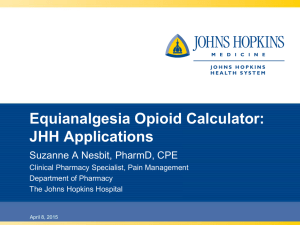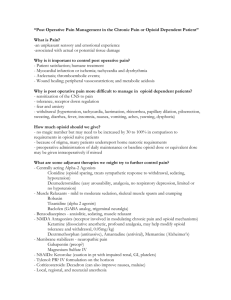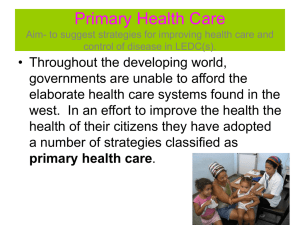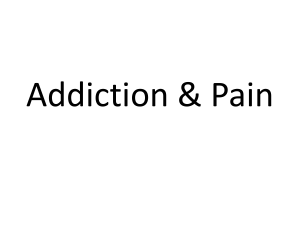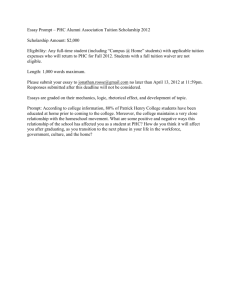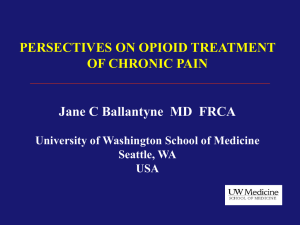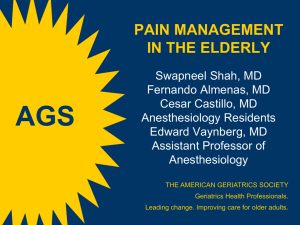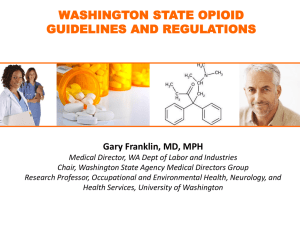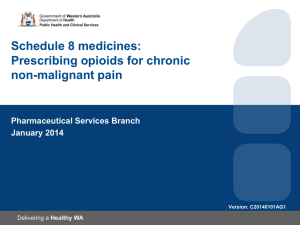Formulary Utilization Management for Managing Pain Safely program
advertisement
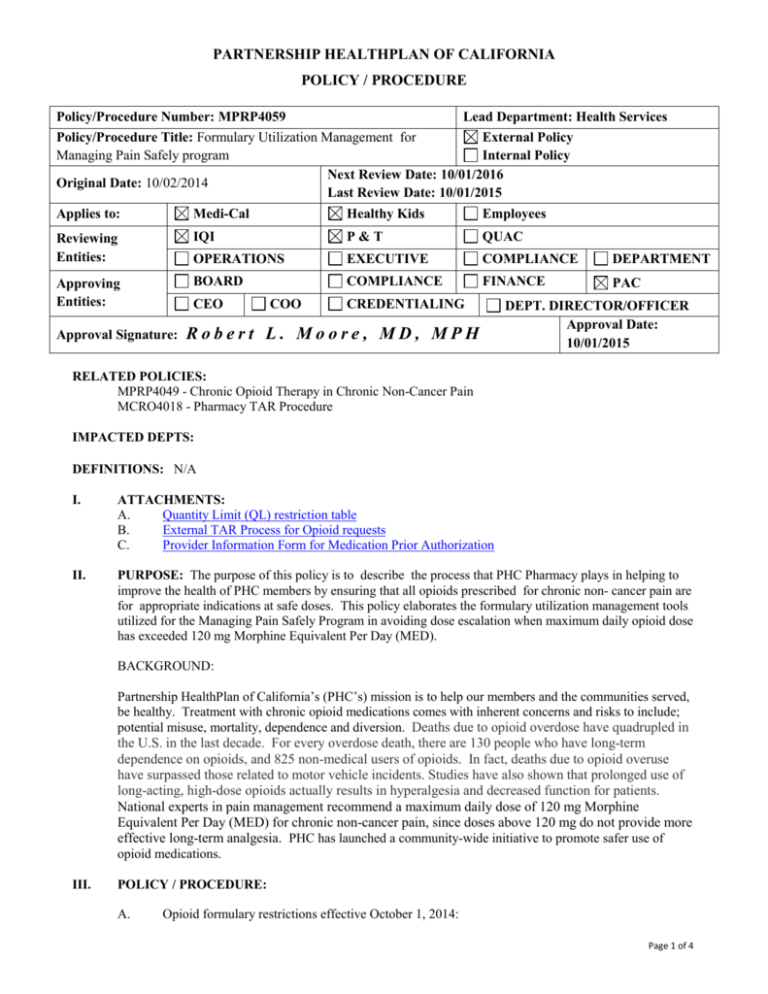
PARTNERSHIP HEALTHPLAN OF CALIFORNIA POLICY / PROCEDURE Policy/Procedure Number: MPRP4059 Lead Department: Health Services Policy/Procedure Title: Formulary Utilization Management for External Policy Managing Pain Safely program Internal Policy Next Review Date: 10/01/2016 Original Date: 10/02/2014 Last Review Date: 10/01/2015 Applies to: Medi-Cal Healthy Kids Employees Reviewing Entities: IQI P&T QUAC OPERATIONS EXECUTIVE COMPLIANCE DEPARTMENT Approving Entities: BOARD COMPLIANCE FINANCE PAC CEO Approval Signature: COO CREDENTIALING Robert L. Moore, MD, MPH DEPT. DIRECTOR/OFFICER Approval Date: 10/01/2015 RELATED POLICIES: MPRP4049 - Chronic Opioid Therapy in Chronic Non-Cancer Pain MCRO4018 - Pharmacy TAR Procedure IMPACTED DEPTS: DEFINITIONS: N/A I. ATTACHMENTS: A. Quantity Limit (QL) restriction table B. External TAR Process for Opioid requests C. Provider Information Form for Medication Prior Authorization II. PURPOSE: The purpose of this policy is to describe the process that PHC Pharmacy plays in helping to improve the health of PHC members by ensuring that all opioids prescribed for chronic non- cancer pain are for appropriate indications at safe doses. This policy elaborates the formulary utilization management tools utilized for the Managing Pain Safely Program in avoiding dose escalation when maximum daily opioid dose has exceeded 120 mg Morphine Equivalent Per Day (MED). BACKGROUND: Partnership HealthPlan of California’s (PHC’s) mission is to help our members and the communities served, be healthy. Treatment with chronic opioid medications comes with inherent concerns and risks to include; potential misuse, mortality, dependence and diversion. Deaths due to opioid overdose have quadrupled in the U.S. in the last decade. For every overdose death, there are 130 people who have long-term dependence on opioids, and 825 non-medical users of opioids. In fact, deaths due to opioid overuse have surpassed those related to motor vehicle incidents. Studies have also shown that prolonged use of long-acting, high-dose opioids actually results in hyperalgesia and decreased function for patients. National experts in pain management recommend a maximum daily dose of 120 mg Morphine Equivalent Per Day (MED) for chronic non-cancer pain, since doses above 120 mg do not provide more effective long-term analgesia. PHC has launched a community-wide initiative to promote safer use of opioid medications. III. POLICY / PROCEDURE: A. Opioid formulary restrictions effective October 1, 2014: Page 1 of 4 Policy/Procedure Number: MPRP4059 Lead Department: Health Services Policy/Procedure Title: Formulary Utilization Management for Managing Pain Safely program ☒External Policy Original Date: 10/02/2014 Applies to: B. ☒ Medi-Cal ☐Internal Policy Next Review Date: 10/01/2016 Last Review Date: 10/01/2015 ☒ Healthy Kids ☐ Employees 1. Restricted Quantity Limit (QL): All PHC formulary opioids have an established QL for each single dose strength not to exceed a maximum daily dose of 120 mg MED. 2. Formulary Status change: a. Morphine 100 mg and 200 mg ER tablets are designated as non-formulary in lieu of a QL restriction. b. Methadone concentrate is designated as non-formulary since it should have been limited use in non-cancer pain therapy. c. Methadone 40 mg tablets are designated as non-formulary in lieu of a QL restriction. 3. Refill Too Soon: A prescription for all opioids are considered to be filled “too frequent” if less than 90% of the day’s supply submitted with the last fill has not elapsed. Opioid treatment authorization request (TAR) processing: 1. Opioid claims that reject for either QL limit exceeded, non-formulary status or refill too soon will require TAR processing by dispensing pharmacies and review by PHC pharmacy service department 2. PHC pharmacy will review TAR to identify diagnosis, dose escalation and /or other concurrent opioid medication. 3. Opioid utilization for cancer pain will be approved as requested by provider 4. Opioid utilization for non- cancer pain demonstrating at least 3 months of consecutive fills without dose escalating ( dose increase) is considered continuing care and may be approved if medically necessary. a. Prescriber messaging for continuing care approvals (Attachment D):: 1) The request has been approved for (Insert Approval Timeframe) months. National experts in pain management recommend a maximum daily dose of 120 mg Morphine Equivalent Per Day (MED) for chronic non-cancer pain, since doses above 120 mg do not provide more effective long-term analgesia. Additionally, such high doses can lead to more problems, including tolerance, opioid-induced hyperalgesia, and greater risk of side effects including accidental over dose. The current request for (Insert Drug Name) will be approved for (Insert Approval Timeframe) months. PHC strongly advises this patient be placed on a program to gradually taper his/her narcotic dose down to a level closer to the 120 mg MED range. A plan for tapering this patient's total opioid dosing or clinical documentation and rationale was not provided. Please complete the attached opioid treatment explanation form and be prepared to provide a plan for tapering this patient’s total opioid dosing or clinical documentation and rationale for continued high dose opioid prescription with the next TAR submission. b. Subsequent opioid fill requests that have been previously reviewed by PHC for dose stable will require a TAR. Because the opioid dosing may be stable but exceeds the 120MED limit, further PHC intervention may require prescriber submission of plan for tapering patient’s total opioid dosing (Attachment C). 5. Opioid utilization for non-cancer pain that is determined to be dose escalation (dose increase) will be denied. Page 2 of 4 Policy/Procedure Number: MPRP4059 Lead Department: Health Services Policy/Procedure Title: Formulary Utilization Management for Managing Pain Safely program ☒External Policy Original Date: 10/02/2014 Applies to: ☒ Medi-Cal ☐Internal Policy Next Review Date: 10/01/2016 Last Review Date: 10/01/2015 ☒ Healthy Kids ☐ Employees a. 6. 7. The request for dose increase will be denied but the member maybe allowed to continue at previous dose if needed. PHC pharmacy will authorize a pro-active TAR at the previous stable dose that member was taking if appropriate. The dispensing pharmacy will need to contact prescriber to obtain authorization/prescription for opioid at the previous dose. b. PHC Prescriber messaging for denials(Attachment E): 1) Denial (dose increase): The requested drug is denied because documentation submitted did not support medical necessity for dose escalation (PHC Opioid Policy MPRP4059). National experts in pain management recommend a maximum daily dose of 120 mg Morphine Equivalent Per Day (MED) for chronic non-cancer pain, since doses above 120 mg do not provide more effective long-term analgesia. Any further dose increase will not provide better long-term pain relief. Additionally, it can lead to more problems, including tolerance, opioid-induced hyperalgesia, and greater risk of side effects including accidental over dose. c. Member messaging for denials (Attachment F): 1) The requested drug is denied. Information for medical need at a higher dose was not met. Doses higher than what you are currently taking do not give better longterm pain relief (PHC Opioid Policy MPRP4059). Appropriate and timely member notification of PHC determination for the denial and information about the appeals process will be done as per policy MCRO4018 Pharmacy TAR Procedure. The plan assists the prescribers by identifying outliers such as members utilizing high dose opioids, members with known compliance problems, members receiving controlled substances from multiple prescribers and shares this information with the prescriber. IV. REFERENCES: A. Canadian Guideline for Safe and Effective Use of Opioids for Chronic Non-Cancer Pain. April 30, 2010 http://nationalpaincentre.mcmaster.ca/opioid/ B. CDC – Common Elements in Guidelines for Prescribing Opioids for Chronic Pain. http://www.cdc.gov/homeandrecreationalsafety/pdf/Common_Elements_in_Guidelines_for_Prescrib ing_Opioids-a.pdf V. DISTRIBUTION: A. PHC Department Directors, B. PHC Provider and Practitioner Manuals C. SharePoint VI. POSITION RESPONSIBLE FOR IMPLEMENTING PROCEDURE: A. Pharmacy Services Director VII. REVISION DATES: XI. POLICY DISCLAIMER: A. In accordance with the California Health and Safety Code, Section 1363.5, this policy was developed with involvement from actively practicing health care providers and meets these provisions: 1. Consistent with sound clinical principles and processes; Page 3 of 4 Policy/Procedure Number: MPRP4059 Lead Department: Health Services Policy/Procedure Title: Formulary Utilization Management for Managing Pain Safely program ☒External Policy Original Date: 10/02/2014 Applies to: ☒ Medi-Cal ☐Internal Policy Next Review Date: 10/01/2016 Last Review Date: 10/01/2015 ☒ Healthy Kids ☐ Employees 2. Evaluated and updated at least annually; 3. If used as the basis of a decision to modify, delay or deny services in a specific case, the criteria will be disclosed to the provider and/or enrollee upon request. B. The materials provided are guidelines used by PHC to authorize, modify or deny services for persons with similar illnesses or conditions. Specific care and treatment may vary depending on individual need and the benefits covered under PHC. Page 4 of 4
